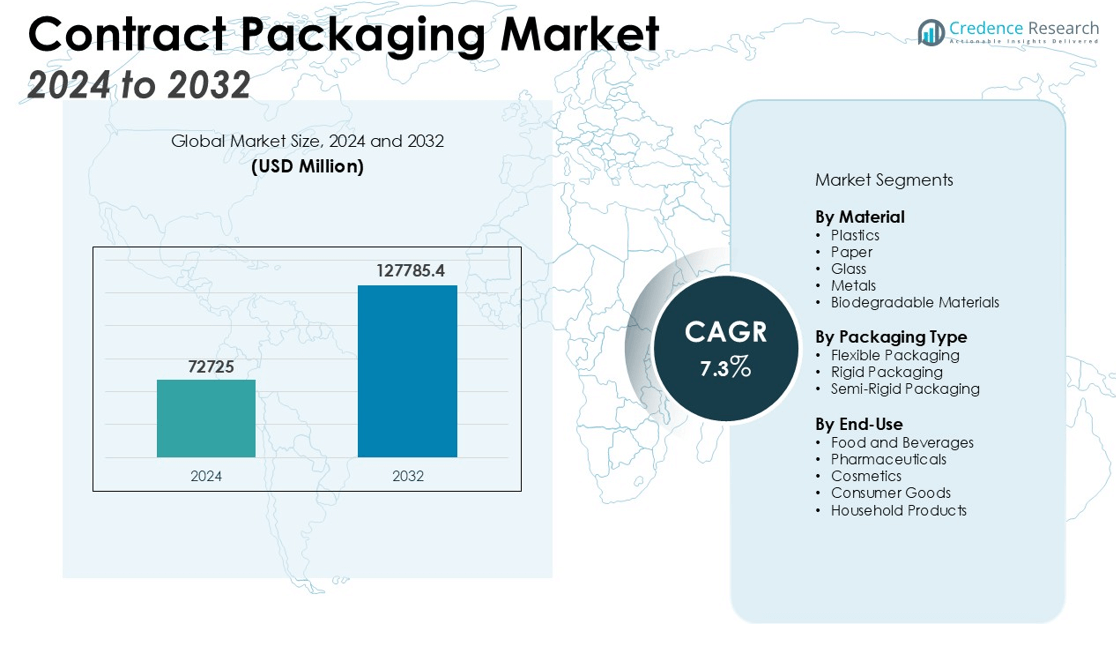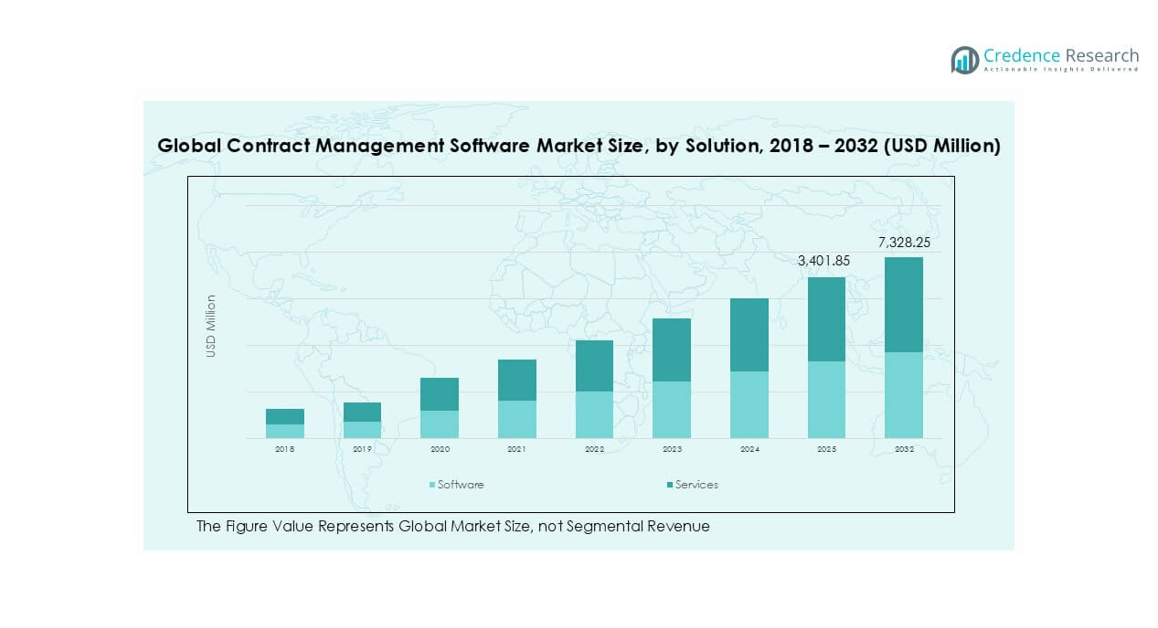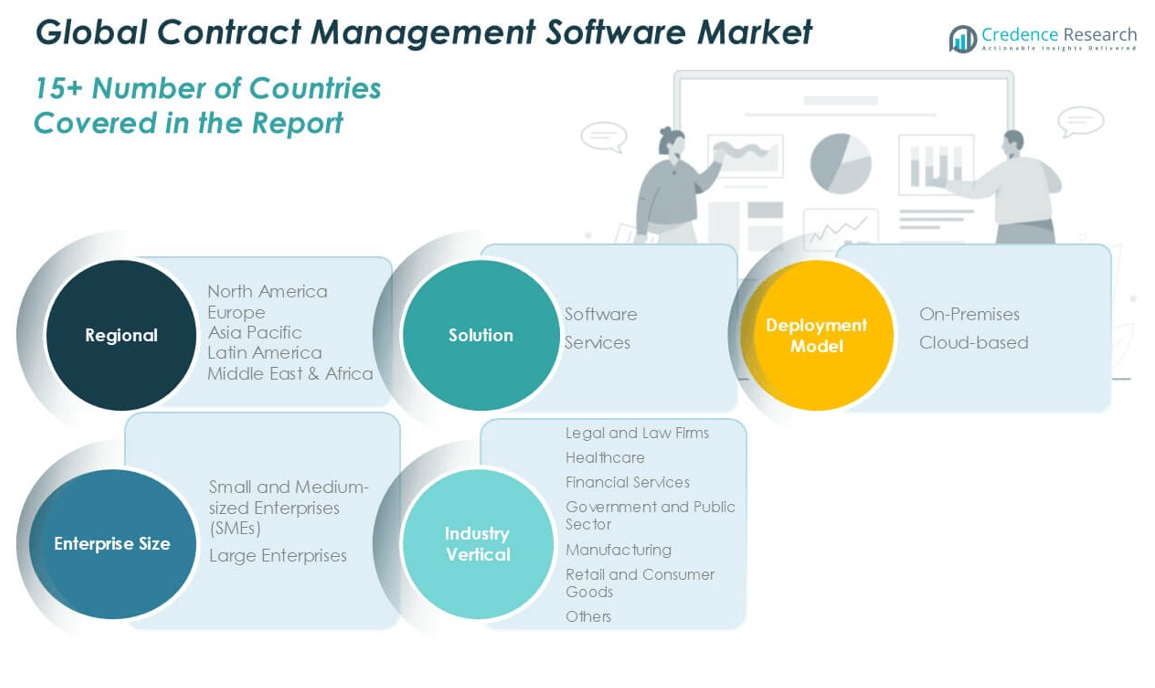CHAPTER NO. 1: GENESIS OF THE MARKET
1.1 Market Prelude – Introduction & Scope
1.2 The Big Picture – Objectives & Vision
1.3 Strategic Edge – Unique Value Proposition
1.4 Stakeholder Compass – Key Beneficiaries
CHAPTER NO. 2: EXECUTIVE LENS
2.1 Pulse of the Industry – Market Snapshot
2.2 Growth Arc – Revenue Projections (USD Million)
2.3. Premium Insights – Based on Primary Interviews
CHAPTER NO. 3: CONTRACT MANAGEMENT SOFTWARE MARKET FORCES & INDUSTRY PULSE
3.1 Foundations of Change – Market Overview
3.2 Catalysts of Expansion – Key Market Drivers
3.2.1 Momentum Boosters – Growth Triggers
3.2.2 Innovation Fuel – Disruptive Technologies
3.3 Headwinds & Crosswinds – Market Restraints
3.3.1 Regulatory Tides – Compliance Challenges
3.3.2 Economic Frictions – Inflationary Pressures
3.4 Untapped Horizons – Growth Potential & Opportunities
3.5 Strategic Navigation – Industry Frameworks
3.5.1 Market Equilibrium – Porter’s Five Forces
3.5.2 Ecosystem Dynamics – Value Chain Analysis
3.5.3 Macro Forces – PESTEL Breakdown
3.6 Price Trend Analysis
3.6.1 Regional Price Trend
3.6.2 Price Trend by Service
CHAPTER NO. 4: KEY INVESTMENT EPICENTER
4.1 Regional Goldmines – High-Growth Geographies
4.2 Service Frontiers – Lucrative Service Categories
4.3 Application Sweet Spots – Emerging Demand Segments
CHAPTER NO. 5: REVENUE TRAJECTORY & WEALTH MAPPING
5.1 Momentum Metrics – Forecast & Growth Curves
5.2 Regional Revenue Footprint – Market Share Insights
5.3 Segmental Wealth Flow – Solution & Enterprise Size Revenue
CHAPTER NO. 6: TRADE & COMMERCE ANALYSIS
6.1. Import Analysis by Region
6.1.1. Global Contract Management Software Market Import Revenue By Region
6.2. Export Analysis by Region
6.2.1. Global Contract Management Software Market Export Revenue By Region
CHAPTER NO. 7: COMPETITION ANALYSIS
7.1. Company Market Share Analysis
7.1.1. Global Contract Management Software Market: Company Market Share
7.2. Global Contract Management Software Market Company Revenue Market Share
7.3. Strategic Developments
7.3.1. Acquisitions & Mergers
7.3.2. New Service Launch
7.3.3. Regional Expansion
7.4. Competitive Dashboard
7.5. Company Assessment Metrics, 2024
CHAPTER NO. 8: CONTRACT MANAGEMENT SOFTWARE MARKET – BY SOLUTION SEGMENT ANALYSIS
8.1. Contract Management Software Market Overview by Solution Segment
8.1.1. Contract Management Software Market Revenue Share By Solution
8.2. Software
8.3. Services
CHAPTER NO. 9: CONTRACT MANAGEMENT SOFTWARE MARKET – BY DEPLOYMENT MODEL SEGMENT ANALYSIS
9.1. Contract Management Software Market Overview by Deployment Model Segment
9.1.1. Contract Management Software Market Revenue Share By Deployment Model
9.2. On-Premises
9.3. Cloud-based
CHAPTER NO. 10: CONTRACT MANAGEMENT SOFTWARE MARKET – BY ENTERPRISE SIZE SEGMENT ANALYSIS
10.1. Contract Management Software Market Overview by Enterprise Size Segment
10.1.1. Contract Management Software Market Revenue Share By Enterprise Size
10.2. Small and Medium-sized Enterprises (SMEs)
10.3. Large Enterprises
CHAPTER NO. 11: CONTRACT MANAGEMENT SOFTWARE MARKET – BY INDUSTRY VERTICAL SEGMENT ANALYSIS
11.1. Contract Management Software Market Overview by Industry Vertical Segment
11.1.1. Contract Management Software Market Revenue Share By Industry Vertical
11.2. Legal and Law Firms
11.3. Healthcare
11.4. Financial Services
11.5. Government and Public Sector
11.6. Manufacturing
11.7. Retail and Consumer Goods
11.8. Others
CHAPTER NO. 12: CONTRACT MANAGEMENT SOFTWARE MARKET – REGIONAL ANALYSIS
12.1. Contract Management Software Market Overview by Region Segment
12.1.1. Global Contract Management Software Market Revenue Share By Region
12.1.2. Regions
12.1.3. Global Contract Management Software Market Revenue By Region
12.1.4. Solution
12.1.5. Global Contract Management Software Market Revenue By Solution
12.1.6. Deployment Model
12.1.7. Global Contract Management Software Market Revenue By Deployment Model
12.1.8. Enterprise Size
12.1.9. Global Contract Management Software Market Revenue By Enterprise Size
12.1.10. Industry Vertical
12.1.11. Global Contract Management Software Market Revenue By Industry Vertical
CHAPTER NO. 13: NORTH AMERICA CONTRACT MANAGEMENT SOFTWARE MARKET – COUNTRY ANALYSIS
13.1. North America Contract Management Software Market Overview by Country Segment
13.1.1. North America Contract Management Software Market Revenue Share By Region
13.2. North America
13.2.1. North America Contract Management Software Market Revenue By Country
13.2.2. Solution
13.2.3. North America Contract Management Software Market Revenue By Solution
13.2.4. Deployment Model
13.2.5. North America Contract Management Software Market Revenue By Deployment Model
13.2.6. Enterprise Size
13.2.7. North America Contract Management Software Market Revenue By Enterprise Size
13.2.8. Industry Vertical
13.2.9. North America Contract Management Software Market Revenue By Industry Vertical
13.3. U.S.
13.4. Canada
13.5. Mexico
CHAPTER NO. 14: EUROPE CONTRACT MANAGEMENT SOFTWARE MARKET – COUNTRY ANALYSIS
14.1. Europe Contract Management Software Market Overview by Country Segment
14.1.1. Europe Contract Management Software Market Revenue Share By Region
14.2. Europe
14.2.1. Europe Contract Management Software Market Revenue By Country
14.2.2. Solution
14.2.3. Europe Contract Management Software Market Revenue By Solution
14.2.4. Deployment Model
14.2.5. Europe Contract Management Software Market Revenue By Deployment Model
14.2.6. Enterprise Size
14.2.7. Europe Contract Management Software Market Revenue By Enterprise Size
14.2.8. Industry Vertical
14.2.9. Europe Contract Management Software Market Revenue By Industry Vertical
14.3. UK
14.4. France
14.5. Germany
14.6. Italy
14.7. Spain
14.8. Russia
14.9. Rest of Europe
CHAPTER NO. 15: ASIA PACIFIC CONTRACT MANAGEMENT SOFTWARE MARKET – COUNTRY ANALYSIS
15.1. Asia Pacific Contract Management Software Market Overview by Country Segment
15.1.1. Asia Pacific Contract Management Software Market Revenue Share By Region
15.2. Asia Pacific
15.2.1. Asia Pacific Contract Management Software Market Revenue By Country
15.2.2. Solution
15.2.3. Asia Pacific Contract Management Software Market Revenue By Solution
15.2.4. Deployment Model
15.2.5. Asia Pacific Contract Management Software Market Revenue By Deployment Model
15.2.6. Enterprise Size
15.2.7. Asia Pacific Contract Management Software Market Revenue By Enterprise Size
15.2.8. Industry Vertical
15.2.9. Asia Pacific Contract Management Software Market Revenue By Industry Vertical
15.3. China
15.4. Japan
15.5. South Korea
15.6. India
15.7. Australia
15.8. Southeast Asia
15.9. Rest of Asia Pacific
CHAPTER NO. 16: LATIN AMERICA CONTRACT MANAGEMENT SOFTWARE MARKET – COUNTRY ANALYSIS
16.1. Latin America Contract Management Software Market Overview by Country Segment
16.1.1. Latin America Contract Management Software Market Revenue Share By Region
16.2. Latin America
16.2.1. Latin America Contract Management Software Market Revenue By Country
16.2.2. Solution
16.2.3. Latin America Contract Management Software Market Revenue By Solution
16.2.4. Deployment Model
16.2.5. Latin America Contract Management Software Market Revenue By Deployment Model
16.2.6. Enterprise Size
16.2.7. Latin America Contract Management Software Market Revenue By Enterprise Size
16.2.8. Industry Vertical
16.2.9. Latin America Contract Management Software Market Revenue By Industry Vertical
16.3. Brazil
16.4. Argentina
16.5. Rest of Latin America
CHAPTER NO. 17: MIDDLE EAST CONTRACT MANAGEMENT SOFTWARE MARKET – COUNTRY ANALYSIS
17.1. Middle East Contract Management Software Market Overview by Country Segment
17.1.1. Middle East Contract Management Software Market Revenue Share By Region
17.2. Middle East
17.2.1. Middle East Contract Management Software Market Revenue By Country
17.2.2. Solution
17.2.3. Middle East Contract Management Software Market Revenue By Solution
17.2.4. Deployment Model
17.2.5. Middle East Contract Management Software Market Revenue By Deployment Model
17.2.6. Enterprise Size
17.2.7. Middle East Contract Management Software Market Revenue By Enterprise Size
17.2.8. Industry Vertical
17.2.9. Middle East Contract Management Software Market Revenue By Industry Vertical
17.3. GCC Countries
17.4. Israel
17.5. Turkey
17.6. Rest of Middle East
CHAPTER NO. 18: AFRICA CONTRACT MANAGEMENT SOFTWARE MARKET – COUNTRY ANALYSIS
18.1. Africa Contract Management Software Market Overview by Country Segment
18.1.1. Africa Contract Management Software Market Revenue Share By Region
18.2. Africa
18.2.1. Africa Contract Management Software Market Revenue By Country
18.2.2. Solution
18.2.3. Africa Contract Management Software Market Revenue By Solution
18.2.4. Deployment Model
18.2.5. Africa Contract Management Software Market Revenue By Deployment Model
18.2.6. Enterprise Size
18.2.7. Africa Contract Management Software Market Revenue By Enterprise Size
18.2.8. Industry Vertical
18.2.9. Africa Contract Management Software Market Revenue By Industry Vertical
18.3. South Africa
18.4. Egypt
18.5. Rest of Africa
CHAPTER NO. 19: COMPANY PROFILES
19.1. SAP
19.1.1. Company Overview
19.1.2. Service Portfolio
19.1.3. Financial Overview
19.1.4. Recent Developments
19.1.5. Growth Strategy
19.1.6. SWOT Analysis
19.2. Coupa Software
19.3. Infor
19.4. ContractWorks
19.5. SirionLabs
19.6. Zycus
19.7. Agiloft
19.8. Company 8
19.9. Company 9
19.10. Company 10






